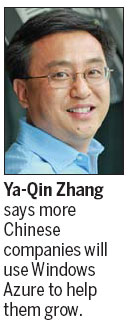Heads in the cloud, hands-on solutions
Updated: 2013-01-25 07:56
By Lin Jing (China Daily)
|
||||||||
|
One of Microsoft's data centers in Chicago contains up to 2,500 servers. Provided to China Daily |
Computer giant is building lucrative stairway to heaven
Microsoft will start the second phase of its Microsoft Accelerator for Windows Azure program this month, another step towards the official introduction of public cloud computing in China.
The program focuses on small startups, encouraging innovation in the Windows Azure platform.
Startups can have access to free software and development tools, the Windows Azure, mentorship from top executives and technologists in Microsoft, as well as legal and business support from third-party professionals. Companies will have the chance to pitch to angel investors and venture capitalists at the end of the program.
It is in the long run that Microsoft expects returns, says Ya-Qin Zhang, corporate vice-president of Microsoft Corporation and chairman of Microsoft Asia-Pacific R&D Group.
"These companies can find out the differences with other kinds of similar services, and use our resources to help them grow. Our benefit in this program is that they can also assist us in introducing cloud computing to China by helping us to identify specific problems during their use."
Windows Azure is billed as "an open and flexible cloud platform that enables companies to quickly build, deploy and manage applications across a global network of Microsoft-managed data centers. Users can build applications using any language, tool or operating system and integrate the public cloud applications with existing IT environment", Microsoft says.
It was first put into business nearly three years ago and is now commercially available in 89 countries, and at the same time hosts many Microsoft cloud services such as Office 365, which allows users to access and share their Microsoft Office documents in the cloud.
Microsoft Accelerator for Windows Azure began last July, and the first stage is said to be bearing fruit. In December the first batch of 10 candidates graduated from this program and showed their progress to the public.
Vjianke.com was one of the companies chosen for the program six months ago. The website provides an online storage service for users to collect and store their pictures, documents or videos on a remote server.
Kevin Zhang, CEO of the company, says the service requires fast access and a large amount of storage online. "For us, what cloud computing provides is a powerful server with amazing computing and storage capacity."
Yu Zhichen, one of the founders of uzoo.cn, says the Azure platform has eased the path for its development. Uzoo.com offers a product called Wormhole that functions similarly to the Chinese version of Siri on the Android platform. It was launched last March and says it already has 5.6 million registered users.
"Azure is a solid backup for our product with its strong computing capacity," Yu says. "And it also lowers our cost by 70 percent to 80 percent on average."

Ya-Qin Zhang says that in the program, Microsoft's role is simple. It chooses only companies with mature products and a core team, and aims to speed up their development with technical support and guidance.
Most companies in the first batch focus on social networking services. In the second batch of 20 companies, most are developing applications.
Zhang says that compared with big enterprises, small startups are more ready to adopt cloud computing and more appropriate for it.
"Most of the decision-makers realize that the construction of infrastructure of cloud computing is a long and slow process that requires resources and investment to build, and experience to maintain; for small companies, it is even harder, so a third-party platform is necessity."
For FaciShare, one of the companies in the second batch, Microsoft's reputation and the big platform are highly attractive.
FaciShare was established in December 2011 and mainly works on online office automation. It already has some clients, including Tsinghua University and Macalline Furniture.
Luo Xu, chairman and CEO of the company, says Microsoft provides not only a display platform, but also innovations. "It will bring us a good environment for growth."
Cloud computing has increasingly become popular. The term cloud refers to an amorphous mass of IT applications and services that can be combined, integrated and tailored in numerous ways over the Internet and local networks to increase an organization's efficiency.
A report by IDC, a market research and advisory firm, says that by 2015 cloud computing will create about 14 million jobs. Another research firm, Forrester, says the cloud computing market in China will be worth $3.8 billion (2.9 billion euros) annually in 2020, more than 10 times what it was in 2011.
Microsoft CEO Steve Ballmer has made a frequently quoted speech-"For the cloud, we're all in"-and the company has spared no effort in promoting the service.
Since 2008 Microsoft has invested more than $2.3 billion in cloud infrastructure, building eight data centers for Windows Azure worldwide. By June last year more than 100,000 customers had moved on to the platform, computer use has doubled in the past six months, and storage has doubled over the past two months. To fully prepare for China, the company set up China Cloud Innovation Center in Shanghai in 2010.
Last July Microsoft and PPTV, a Chinese Internet TV service provider, signed a partnership memorandum to launch PPTV Asia TV Networks platform on Windows Azure.
This is also Microsoft's first cloud-based collaboration with a local Chinese new media company.
According to the memorandum, Windows Azure will be the core infrastructure platform for ATVN's cloud-based Internet TV system to meet growing global Internet TV demand.
Right now, out of its 40,000 employees worldwide, 80 percent of them are in cloud-related areas, and the figure is expected to reach 90 percent soon.
But Zhang says that cloud computing is a proven model in the US, while in China it is still in the primary stage because of the lack of a data center and related services.
When introducing private cloud services to China in 2008, Microsoft made several changes for the market.
Zhang says domestic users have a contradictory attitude toward cloud computing, and that there are many difficulties in promoting public cloud computing in China.
"There are many different telecom operators in China. The communication between them, the high cost of Internet and electricity, is a real problem that sets many enterprises back.
"For local chief information officers, collaborated with various telecom operators to construct their cloud computing will increase cost and risk. They still prefer a complete package of cloud solutions, which will remove all the barriers caused by different areas or telecom operators, and lower their cost accordingly. They also require the freedom to change between private and public clouds."
In November Microsoft signed an agreement with the Shanghai municipal government and 21Vianet Group, a local Internet data services provider. It enables customers in China to access Microsoft's Office 365 and Windows Azure services.
Zhang says that right now there is no clear schedule, but he believes the trend is clear. "Microsoft has to be fully devoted to cloud if we want to keep our leading position in the IT industry in the new era."
linjingcd@chinadaily.com.cn
(China Daily 01/25/2013 page17)

 Li Na on Time cover, makes influential 100 list
Li Na on Time cover, makes influential 100 list
 FBI releases photos of 2 Boston bombings suspects
FBI releases photos of 2 Boston bombings suspects
 World's wackiest hairstyles
World's wackiest hairstyles
 Sandstorms strike Northwest China
Sandstorms strike Northwest China
 Never-seen photos of Madonna on display
Never-seen photos of Madonna on display
 H7N9 outbreak linked to waterfowl migration
H7N9 outbreak linked to waterfowl migration
 Dozens feared dead in Texas plant blast
Dozens feared dead in Texas plant blast
 Venezuelan court rules out manual votes counting
Venezuelan court rules out manual votes counting
Most Viewed
Editor's Picks

|

|

|

|

|

|
Today's Top News
Boston bombing suspect reported cornered on boat
7.0-magnitude quake hits Sichuan
Cross-talk artist helps to spread the word
'Green' awareness levels drop in Beijing
Palace Museum spruces up
First couple on Time's list of most influential
H7N9 flu transmission studied
Trading channels 'need to broaden'
US Weekly

|

|








